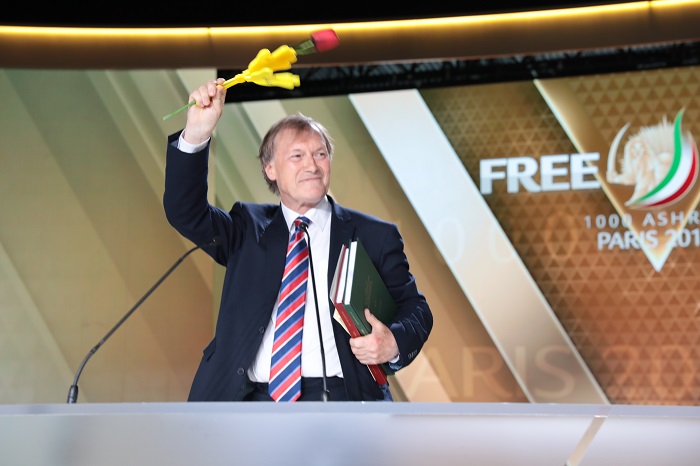
Sir David Amess, the British Member of Parliament representing Southend West, died on Friday, October 15, 2021, after a knife attack at a meeting with constituents. The attacker was taken into custody the same day, and the incident is now being investigated as a possible terrorist attack. A precise motive has yet to be revealed, but the nature of the attack recalls attention to the fact that Amess spent much of his career pushing for assertive foreign policy in response to terrorist activity and terrorist sponsorship, particularly that which is associated with the Iranian regime.
“Today, the Iranian Resistance lost an exceptional friend and the British people lost a great human being,” said Mrs. Maryam Rajavi, the President-elect of the National Council of Resistance of Iran, in a statement on Friday. She added that Amess was “a most commendable example of defense of freedom, democracy, and civil society.”
Amess was a regular presence at NCRI-organized events, including international gatherings of expatriates and political supporters in Paris, up until 2018. He was also co-chair of the British Parliamentary Committee for Iran Freedom since its inception in the mid-2000s.
The BPCFI remembered Amess’ role in a statement, saying that “during his time in the parliament, he frequently raised the many serious threats from the regime in Tehran at parliamentary conferences, debates, and in Early Days Motions advocating for a firm policy on Iran focused on human rights and holding the regime to account for its violations of those rights and terrorism.”
In the weeks prior to his death, Amess contributed to a large-scale campaign aimed at bringing greater attention to a 33-year-old massacre of political prisoners and holding the current Iranian regime president accountable for his role in the killings. His last article published at Townhall addressed the possibility of Ebrahim Raisi attending an international climate change conference in Glasgow, and it argued that he could be arrested for crimes against humanity if he set foot on British soil.
“Such a figure has no business standing among other heads of state at an international conference in the West,” Amess wrote after explaining that Raisi had overseen the mass execution of approximately 30,000 political prisoners in the summer of 1988, as a member of the “death commission” in Tehran. Amess also noted that another, lower-level participant in the massacre, Hamid Noury, had gone on trial in Sweden in August, and that it should therefore be easy to apply the same principle of “universal jurisdiction” to Raisi.
The MP’s simultaneous commitments to exposing Iran’s crimes and countering false allegations about the MEK made Amess a hated figure among the Iranian leadership. This was reflected in Iranian state media’s handling of the topic of his death, which was almost celebratory. The Islamic Republic News Agency condemned Amess for having “never apologized for his positions” toward the regime and for having “continued supporting the MEK until the end.”
Considering the source, Amess would have surely welcomed this language as further proof that his efforts on behalf of the Iranian Resistance had presented Tehran with a serious threat, and that he would be remembered as having stood on the right side of history where Iranian affairs are concerned.
Mrs. Rajavi affirmed this legacy in Friday’s statement, which concluded by saying of Mr. Amess: “His memory will live on for the Iranian people and Resistance. We are proud that he rushed to aid our people’s fight against religious fascism in the darkest period of Iran’s history.”
Amess himself expressed a similar sentiment on September 6, a little over a month before he died: “One of the proudest things I have ever done in my political career is to support the National Council of Resistance of Iran, which calls for the Iranian regime to be replaced with a safer and more democratic government,” he said.
That sense of pride was reportedly reinforced following the NCRI’s international gathering, the last one to take place in Paris to date. Immediately following that event, it was reported that a team of Iranian operatives led by a high-ranking diplomat then stationed in Vienna had attempted to infiltrate the gathering with explosives. Had the terror plot not been thwarted, it would have likely killed hundreds, if not thousands of innocent people, including Western policymakers.
On September 15, in a virtual press conference introducing his book, Eyes and Ears: A Survivor’s Guide to Westminster, to fellow supporters of the NCRI, Amess referenced the 2018 terror plot as a sign that the Iranian regime is afraid of losing its grip on power in the face of an organized opposition group with Western backing. “The fact that they thought we were all worth blowing up means that the strategy of our dear friends is working,” he said.